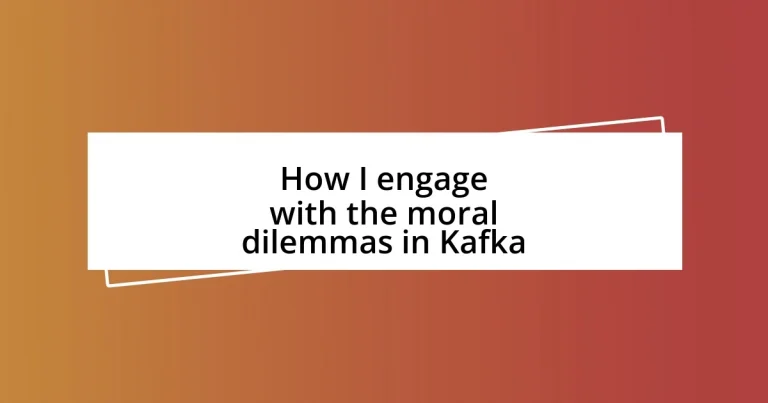Key takeaways:
- Kafka’s works highlight the individual’s struggle against societal indifference, prompting readers to reflect on their own moral decisions and the nature of identity.
- The themes of alienation, guilt, and authority in Kafka’s narratives resonate deeply, encouraging personal introspection about relationships and ethical choices in a complex world.
- Engaging with Kafka’s characters and storytelling techniques fosters a nuanced understanding of accountability, power dynamics, and the impact of our actions in navigating everyday dilemmas.
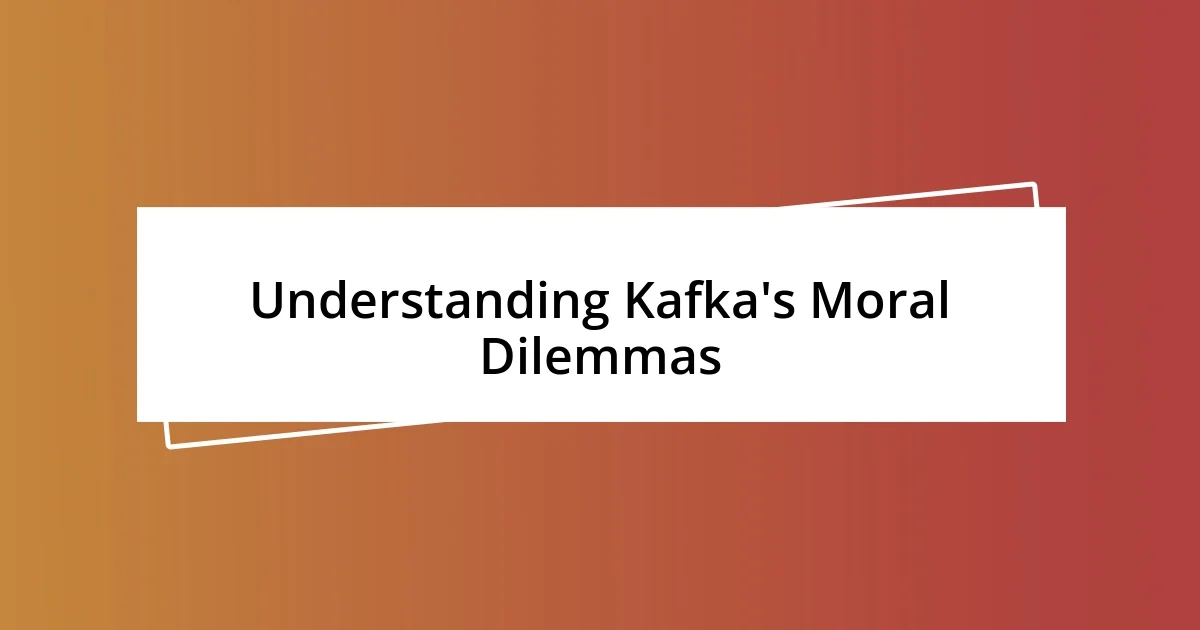
Understanding Kafka’s Moral Dilemmas
Kafka’s moral dilemmas often reflect the struggle of the individual against an incomprehensible and indifferent society. I remember grappling with this aspect while reading “The Trial.” The protagonist, Josef K., experiences a bewildering sense of helplessness that resonated deeply with me. Have you ever felt trapped by circumstances beyond your control? It’s that intense feeling of powerlessness that Kafka captures so vividly.
In “The Metamorphosis,” the transformation of Gregor Samsa into a bug serves as a striking metaphor for alienation and guilt, forcing us to confront our own judgments about identity and worth. When I first encountered this story, I felt a mix of pity and discomfort. It made me ponder: how do we assess someone’s value when their external circumstances change dramatically? This dilemma strikes at the heart of our humanity and pushes us to reflect on our own values.
Kafka’s exploration of guilt is particularly poignant, as he often interweaves personal failings with societal expectations. After reflecting on “The Trial,” I found myself questioning what truly defines our moral compass. Is it the expectations of society, or is it our innate sense of right and wrong? It’s a complex interplay, isn’t it? By engaging with Kafka’s dilemmas, we’re invited to critique not just the characters but also our own moral decisions.
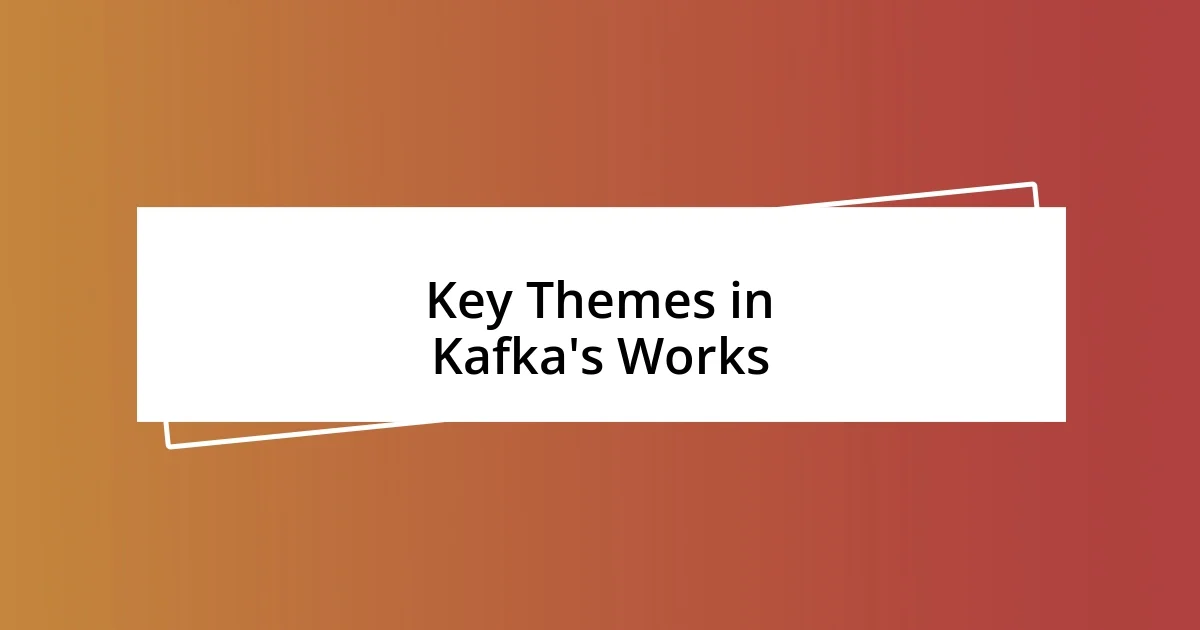
Key Themes in Kafka’s Works
Kafka’s works delve deep into themes of alienation, guilt, and the absurdity of existence. This resonates with me—not just as a reader, but as someone who has faced similar feelings in everyday life. I recall times when I felt isolated in a crowded room, much like Gregor Samsa in “The Metamorphosis.” It’s a haunting reflection of what it means to be disconnected from those around you.
Here are some key themes that stand out in Kafka’s literature:
- Existential Anxiety: Characters frequently confront the absurdity of their situations, leaving readers to ponder the meaning of their lives.
- Alienation: The disconnection between individuals and society is a constant, highlighting feelings of isolation and despair.
- Guilt and Shame: Many stories explore how societal expectations shape our understanding of personal failings.
- The Incomprehensibility of Authority: I often felt a sense of rage and helplessness as characters confront ambiguous, oppressive forces, prompting reflection on my own dealings with authority figures and systems.
- Transformation and Identity: Kafka invites readers to question the nature of identity itself, especially how sudden changes can challenge our perceptions of self-worth.
These themes not only provoke thought but also evoke deep emotional responses, reinforcing our shared human experience.
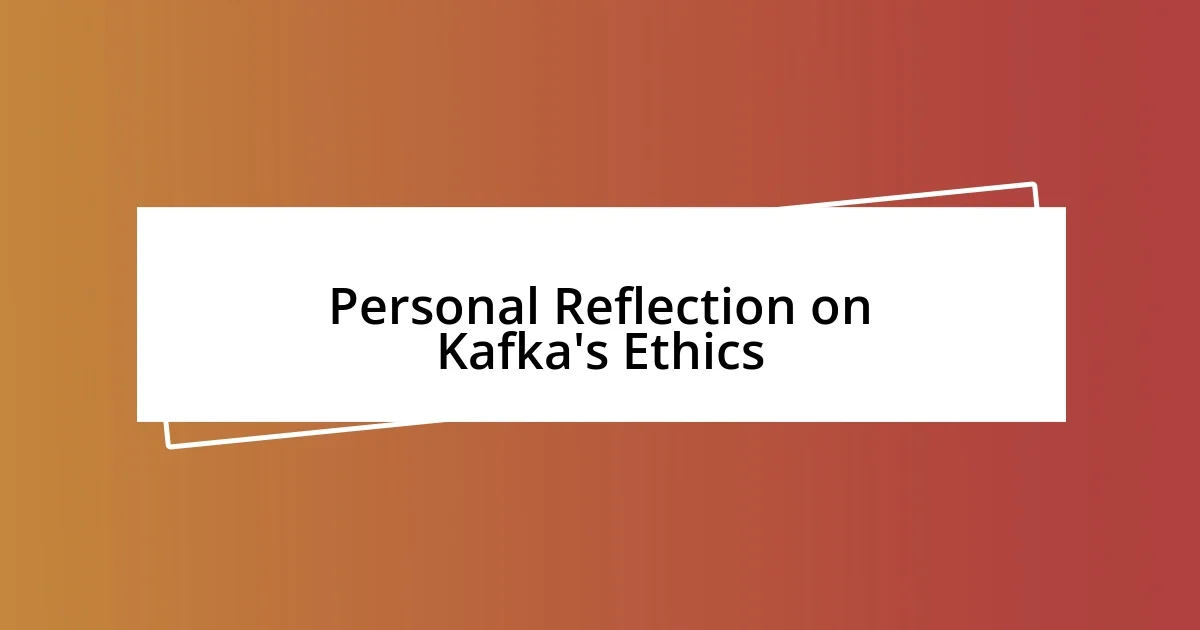
Personal Reflection on Kafka’s Ethics
The ethical landscape in Kafka’s works has provoked a lot of self-reflection for me. One particular instance was when I grappled with the idea of guilt after diving deep into “The Trial.” I recall feeling an unsettling kind of empathy for Josef K., questioning what I would do if faced with a justice system that operates on vague laws and arbitrary judgments. This made me wonder, how often do we judge others without fully understanding their circumstances?
When I think about Kafka’s portrayal of alienation, I can’t help but reflect on a personal experience during a time I felt isolated in a thriving community. I attended a social gathering where everyone seemed to connect effortlessly while I felt invisible. This mirrors Gregor’s plight; his metamorphosis serves as a stark reminder of how we might overlook the struggles of those who seem different. Have you ever felt like an outsider? That feeling of disconnect resonates with my personal journey and reveals deeper truths about how we engage with others—often dismissing them based on surface-level perceptions.
Moreover, Kafka’s treatment of authority encourages me to reconsider not only societal norms but my own moral principles. I think back to a time when I stood by during an injustice, hesitating to act out of fear of repercussions. I found myself reflecting on the cost of compliance versus the weight of moral obligation, particularly in light of Kafka’s characters, who are perpetually caught in a web of unsettling authority. It’s a provocative reminder that ethical choices often come with heavy emotional and social baggage.
| Theme | Personal Reflection |
|---|---|
| Guilt and Judgment | A feeling of empathy for Josef K., questioning my judgment of others in difficult circumstances. |
| Alienation | Feeling invisible at a social event mirrored Gregor’s experience, prompting a reflection on our perceptions of others. |
| Authority | Struggling with my own choices in the face of injustice, learning from Kafka the price of moral compliance. |

Engaging with Kafka’s Characters
Engaging with Kafka’s characters often feels like looking into a mirror that reflects our own fears and uncertainties. Take, for instance, the feeling of helplessness I experienced while reading about Gregor Samsa’s predicament. His transformation into an insect doesn’t just represent a surreal situation; it made me reflect on my own moments of vulnerability. Have you ever felt like the world has suddenly turned against you? That’s the essence of Kafka’s portrayal of existential angst—it pulls us into an experience of profound isolation that I find both unsettling and relatable.
In “The Trial,” I vividly recall feeling entangled in Josef K.’s struggle against a faceless and incomprehensible authority. There’s something about his confusion and desperation that resonates with my experiences in bureaucratic systems. I think back to when I navigated an overly complicated process at work, where shaking loose a straightforward answer seemed impossible. It raised a question for me: how much of our lives are spent wrestling with vague rules imposed by unseen powers? Kafka’s characters force me to confront these broader questions about justice, fairness, and the price of compliance.
When I dive into Kafka’s works, I find myself sparking rich inner dialogues about identity. For instance, I remember struggling with my own self-perception during a challenging transition in my career. Just like Kafka’s protagonists, I grappled with the idea of who I was becoming amidst external pressures. This introspection becomes a shared experience with characters like Gregor and Josef, making me realize the depth of connection we can achieve through their journeys. How do we define ourselves when the world seems to dictate different expectations? Engaging with Kafka brings these personal dilemmas to the forefront, revealing the universal quest for understanding and acceptance.
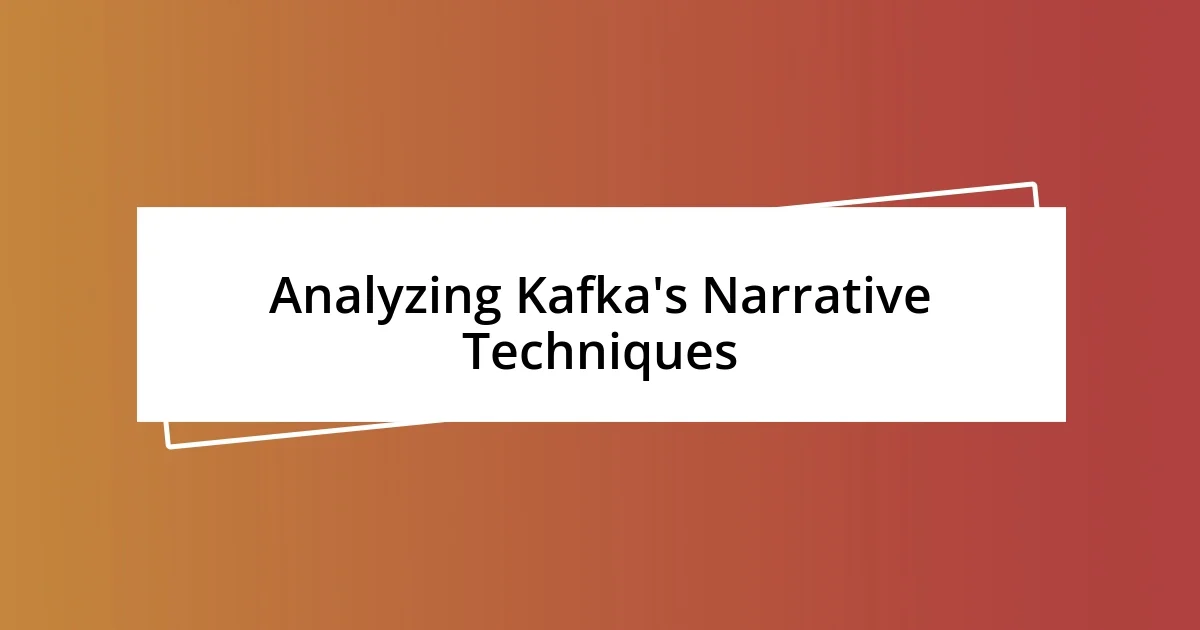
Analyzing Kafka’s Narrative Techniques
Kafka’s narrative techniques are undeniably intriguing, often compelling readers like me to engage deeply with his worlds. One aspect that stands out is his use of surrealism, which distorts reality to evoke feelings of confusion. I remember reading “The Metamorphosis” and marveling at how Gregor’s transformation struck a chord with my own experiences of feeling out of sync with my surroundings. Have you ever felt like reality just didn’t make sense? That dissonance becomes a powerful vehicle in Kafka’s storytelling, allowing us to confront our inner struggles in a tangible way.
Additionally, Kafka’s mastery of ambiguity is something I find both frustrating and captivating. His characters frequently navigate uncertain landscapes, leaving us unsure of their fates. I recall feeling swept up in the chaos of “The Trial,” where Josef K. is pursued by a criminal justice system that defies logic. This uncertainty resonated with me during a time in my life when I faced an unpredictable job market. It prompted me to ponder: how often do we feel trapped in systems that seem to operate beyond our comprehension? Kafka’s narratives remind us that our search for meaning can feel as elusive as the characters’ quests for resolution.
Finally, the narrative voice in Kafka’s works often feels deeply intimate and personal. I can still recall the chilling immediacy of K.’s thoughts echoing in my mind. It mirrors moments in my life when I’ve faced internal crises, such as my battle with self-doubt before a pivotal presentation. I often wonder, can a narrative voice shape our understanding of accountability? Kafka’s unique perspectives encourage readers like me to reflect not just on the tales, but on our own lives, intertwining ethical dilemmas with a profound acknowledgment of our shared vulnerabilities.
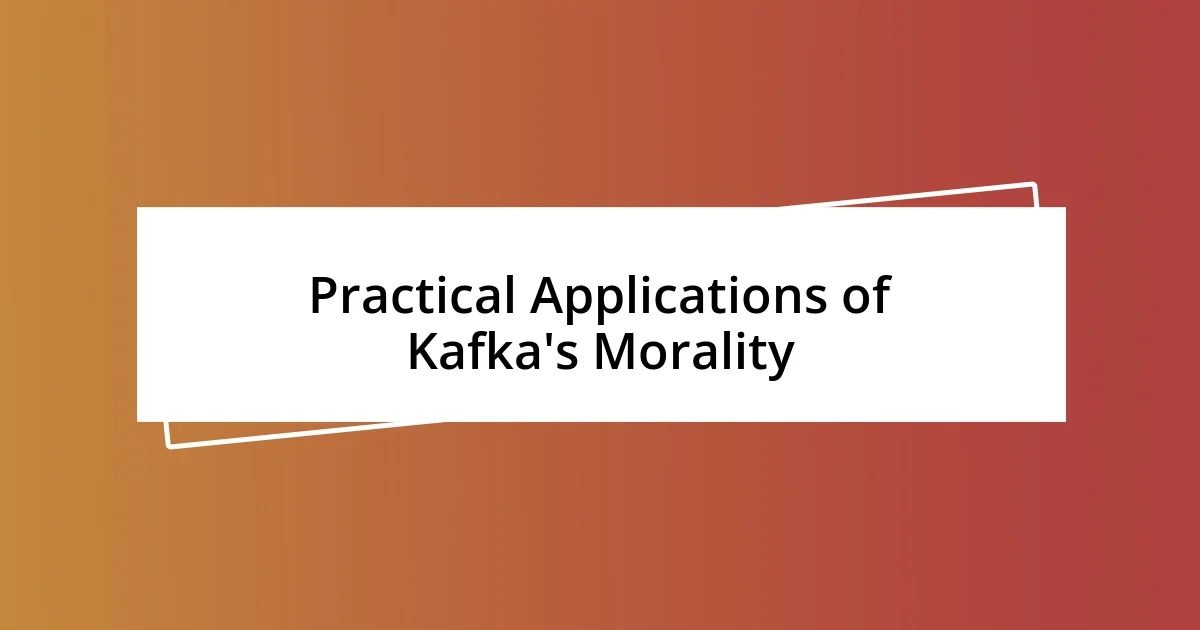
Practical Applications of Kafka’s Morality
Kafka’s exploration of morality can significantly influence how we approach ethical dilemmas in everyday life. I once found myself in a situation where I had to report a mistake made by a colleague that could have serious repercussions for the team. It felt like I was standing at a crossroad, akin to Josef K. facing his trial—would I prioritize loyalty or honesty? This dilemma led me to ponder the weight of individual responsibility and the potential fallout of my decision. How do we measure the impact of our actions in a complex network of relationships?
Engaging with Kafka’s moral complexities encourages a deeper awareness of our own choices. I remember grappling with a decision about whether to intervene in a conflict between friends, unsure if my involvement would help or simply complicate things further. This sense of ambiguity mirrors the confusion experienced by Kafka’s characters, leaving me to reflect on the consequences of inaction versus the risk of stepping in. In these moments, I question: could my striving for clarity create confusion for others, just as it does for Kafka’s protagonists?
Moreover, Kafka’s narratives often highlight the struggle against dehumanizing systems, prompting me to examine my stance within societal frameworks. There was a time when I had to navigate a healthcare bureaucracy, feeling like Gregor Samsa caught in an ever-tightening web of policies and red tape. This experience pushed me to consider how we can lose our humanity in the face of rigid systems. Are we complicit in perpetuating these structures simply by conforming? Through Kafka’s lens, I’ve learned to interrogate my choices and the ethical dimensions tied to the structures I engage with daily.
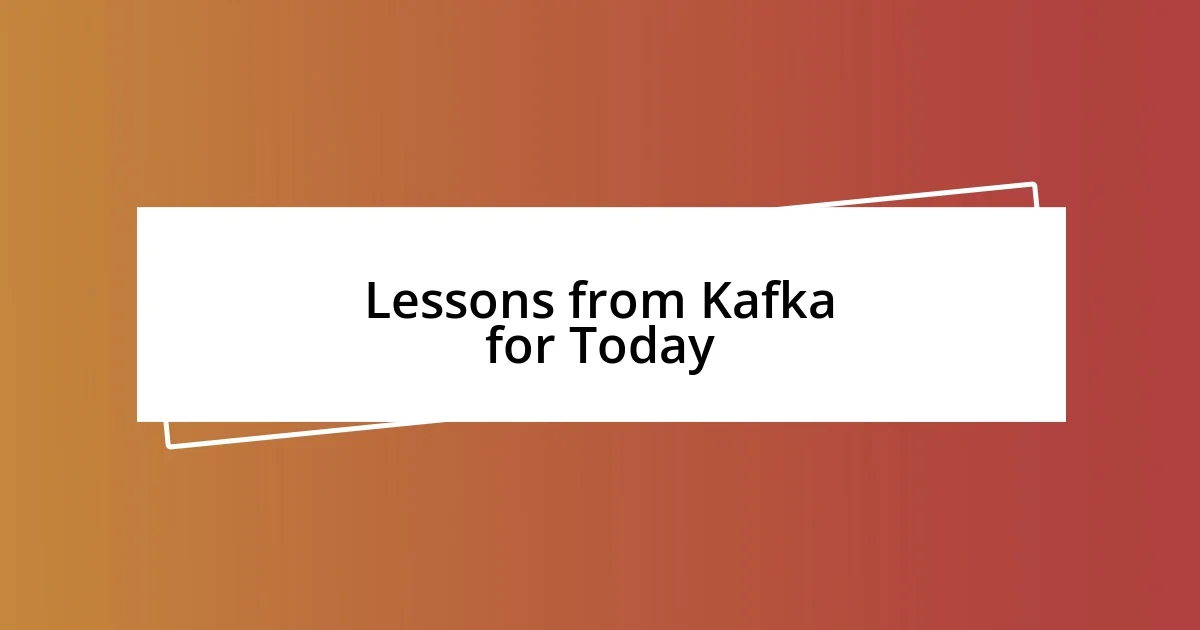
Lessons from Kafka for Today
Kafka’s works offer profound insights that resonate with today’s moral landscape. For instance, I experienced a moment when a decision about attending a friend’s protest weighed heavily on my conscience. I wondered, do we truly understand the implications of our choices? In “The Trial,” the characters navigate systems that seem indifferent, forcing us to consider what happens when we choose inaction over engagement. It’s a reminder that every decision carries weight.
I also reflect on Kafka’s portrayal of alienation, which feels particularly relevant in our hyper-connected world. There was a time at work when I felt isolated despite being surrounded by colleagues. This sense of disconnection parallels the haunting loneliness in Kafka’s stories. I found myself asking, how can we ensure our interactions are genuine? Kafka teaches us that while we may be enveloped in chaos, our humanity lies in the relationships we foster—or fail to nurture.
Moreover, I often ponder the themes of power and bureaucracy in Kafka’s narratives. In my own experience navigating an overcrowded university system, I was left feeling like just another number, losing sight of my individuality. This sentiment echoes throughout Kafka’s stories, provoking me to ask, how can we reclaim our voice in a world that often seeks to silence us? Engaging with Kafka encourages us to challenge the systems around us and recognize our role in shaping a more compassionate society.












